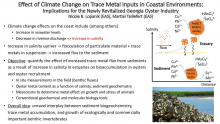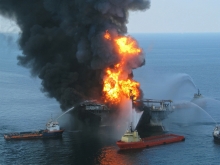- You are here:
- GT Home
- Sciences
- Home
- List of Available Research Projects
The effects of climate change on the coastal ocean include a decrease in riverine inputs and increase in salinity in estuaries with impacts on primary production, macrofauna, and sediment biogeochemistry that are poorly understood. One clear effect of the increase in salinity associated with the decrease in riverine discharge, however, is the enhanced coagulation of inorganic material further upriver. Flocculation of particulate material upriver will enhance its flux to the sediment and simultaneously decrease the outflux of particulate material to the continental shelf.
The urbanization of the coast is generating significant environmental issues, including increasing nutrient runoff that promotes eutrophication and hypoxic conditions in estuaries. At the same time, the excessive input of nutrients is also responsible for an increase acidification of coastal waters, as denitrification in sediments typically generates acidity.
The characterization of sediment biogeochemistry at high spatial and temporal resolution is a necessary step in predicting the overall pathways and extent of hydrocarbon degradation in areas affected during and after an oil spill. However, geochemical data for sediments from deeper environments are scarce, and most studies do not measure the full suite of terminal electron acceptors involved in sediment diagenesis.




